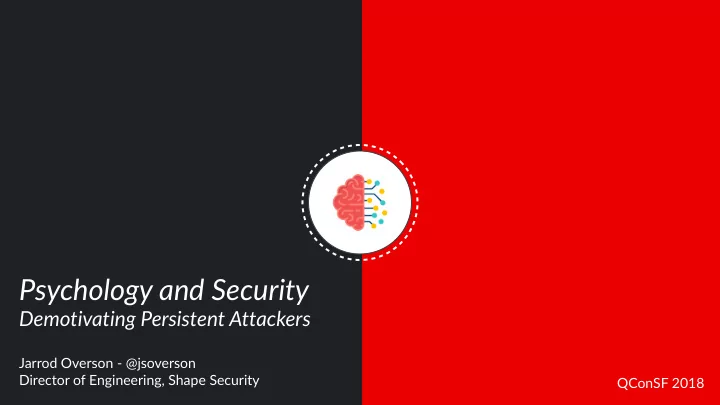

Psychology and Security Demotivating Persistent Attackers Jarrod Overson - @jsoverson Director of Engineering, Shape Security QConSF 2018
HOW DO YOU ENGAGE WITH ATTACKERS WHILE WHILE UNDER ATTACK?
HOW DO YOU KNOW YOU ARE UNDER ATTACK? ATTACK IN THE FIRST PLACE?
0 Imitation attacks and attacker sophistication 1 The economics of attacks 2 Flipping the economics in your favor 3 Case Studies
IN THE BEGINNING, ACCESS WAS GIVEN TO EVERYONE & EVERYTHING
THE MORE WALLS WE PUT UP THE HARDER IT BECAME TO TELL HUMANS AND ATTACKERS APART
TO AFFECT BEHAVIOR, YOU NEED TO REMOVE THE INCENTIVES. INCENTIVE
MANUAL ATTACKS AUTOMATED ATTACKS Sufficient when Sufficient when value is high value is low Can’t scale when value Can’t scale when cost per attack is reduced per attack is increased
THE SECRET TO DEFEATING ATTACKERS Decrease value Increase cost
THE SECRET TO HAPPY USERS Increase value Decrease cost
0 Attacker sophistication & where we are 1 The economics of attacks 2 Flipping the economics in your favor 3 Case Studies
Attack Detail: Credential Stuffing
FROM DATA BREACH TO DAMAGE Data Credential Credential Account Fraud Breach Spill Stuffing Takeover
Outside your control Data Credential Credential Account Fraud Breach Spill Stuffing Takeover
Within your control Data Credential Credential Account Fraud Breach Spill Stuffing Takeover
Your web applications and APIs are the battlefield.
CREDENTIAL STUFFING A STEP BY STEP GUIDE Get Credentials 1 cre·den·\al stuff·ing /krəˈden(t)SHəl ˈstəfiNG/ Automate Login 2 The automated replay of breached username/password pairs across many sites Defeat Automation Defenses in order to take over accounts where 3 passwords have been reused. Distribute Globally 4
CREDENTIAL STUFFING 1 1. Get Credentials
CREDENTIAL STUFFING 2 1. Get Credentials 2. Automate Login
CREDENTIAL STUFFING 2 1. Get Credentials 2. Automate Login
CREDENTIAL STUFFING 2 1. Get Credentials 2. Automate Login
CREDENTIAL STUFFING 3 1. Get Credentials 2. Automate Login 3. Defeat Defenses
CREDENTIAL STUFFING 3 1. Get Credentials 2. Automate Login 3. Defeat Defenses
CREDENTIAL STUFFING 3 1. Get Credentials 2. Automate Login 3. Defeat Defenses
CREDENTIAL STUFFING 3 1. Get Credentials 2. Automate Login 3. Defeat Defenses
CREDENTIAL STUFFING 4 1. Get Credentials 2. Automate Login 3. Defeat Defenses 4. Distribute
CREDENTIAL STUFFING $2 for 1000 global IPs } 1 Combolists starting at $0 2 $50 per site configuration Less than $200 for 100,000 ATO 3 $1.39 per 1000 CAPTCHAs attempts 4
0 Attacker sophistication & where we are 1 The economics of attacks 2 Flipping the economics in your favor 3 Case Studies
vs DETECTION MITIGATION
Have multiple ways to detect bad actors
Also have ways to detect when they’ve started to pry open your systems
TARGET WHAT HURTS THE MOST It’s not as simple as blocking a baddie. You need to target what will hurt the most.
THE SOFTWARE DEVELOPMENT LIFECYCLE Planning What tools work, what don’t? What URLs need to be targeted? What dark web data do I need?
THE SOFTWARE DEVELOPMENT LIFECYCLE Planning Development Investment in a framework of choice. Custom development against a site. Building in proxy/botnet hooks.
THE SOFTWARE DEVELOPMENT LIFECYCLE Planning Development Testing Does it bypass protections? Does it handle edge case responses? Does it consume breach data properly?
THE SOFTWARE DEVELOPMENT LIFECYCLE Planning Development Testing Integration Check integration with botnets. Ensure health checks work. Deploy to cloud services.
THE SOFTWARE DEVELOPMENT LIFECYCLE Planning Development Testing Integration Release Initiate Attack
THE SOFTWARE DEVELOPMENT LIFECYCLE Planning Development Testing Integration Release Cost incurring Value generation stages stage
0 Attacker sophistication & where we are 1 The economics of attacks 2 Flipping the economics in your favor 3 Case Studies
Case Study 1 Damaging Reputation
Scenario vs Well funded Big US Bank scraper
The actor cycled through the softest targets
Finally committed to one to dive deeper The threat found prolonged success on iOS due to version lag
Got around defenses regularly, though not durably
Recognizing patterns in behavior Sun Mon Tues Weds Thurs Fri Sat
1 Regular working schedule 2 Actor’s consumers were notified upon success Analysis 3 Failure was met with downstream frustration 4 Prolonged failure provoked distress
1 Target defense out of working schedule 2 Turn on defenses when damage would be highest Plan of action 3 Turn off primary mitigation during working schedule 4 Cycle through defenses even when still working
Case Study 2 Github Kiddies
Scenario vs Credential Stuffer Big US Retailer and Account taker-overer
We were down to a fraction of our normal ability to detect We needed more data
We had enough of a grip to deliver a targeted payload
This allowed us to inspect the retooling effort in real time
What we learned
1 Actor was a competent developer 2 Still relied on community to get around problems Analysis 3 Bypassed defenses via trial and error 4 Actor was been lucky, not wildly skilled
1 Build up defenses based on the tool he was using 2 Provide variable feedback during retooling phase Plan of action 3 Turn on just enough to be infuriating. No more, no less 4 Create new countermeasures that act differently during retooling phase
1 Treat detection and mitigation separately. 2 Protect the data used to detect. Recap 3 Understand what is incentivizing your attackers. 4 Work with product to build app-level defenses.
TacDcs is knowing what to do when there is something to do. Strategy is knowing what to do when there is nothing to do. - Savielly Tartakower
Psychology and Security Demotivating Persistent Attackers Jarrod Overson - @jsoverson Director of Engineering, Shape Security QConSF 2018
Recommend
More recommend